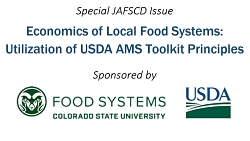Assessing a Local Food System: The Palouse-Clearwater Food Coalition Assessment Process
DOI:
https://doi.org/10.5304/jafscd.2019.08C.008
Keywords:
Local Foods, Case Study, Economic Impact, USDA Local Foods ToolkitAbstract
This case study features the Palouse-Clearwater Food Coalition, an alliance of individuals, community organizations, institutions, agencies, nonprofits, and businesses with a shared interest in developing the local food system in southeastern Washington and north central Idaho. The aim of this case study is to demonstrate how a community coalition could utilize the tools in the U.S. Department of Agriculture, Agricultural Marketing Service’s economic impact toolkit (Thilmany McFadden et al., 2016) to guide its ongoing local food system assessment efforts and to provide structure and direction to its assessment process. The overall goals of the Coalition’s local food economic impact assessment are to (1) make meaningful use of existing data and studies; (2) identify gaps in data, then use the methods presented in the Toolkit to fill in critical data gaps to provide a more complete baseline picture of the region; (3) define and communicate what constitutes economic impact to community stakeholders within the construct of a local food system; (4) understand how data and economic impact principles can help identify leverage points in the local food system; and (5) use information about leverage points to strategically acquire and invest resources in food system projects and research that will strengthen the economic viability of the region.
The Moscow Farmers Market economic assessment is an example of how these goals aligned to influence results. This assessment documented the value of the city of Moscow’s investment to the Moscow Farmers Market Commission and city council. As a result of this assessment, the city moved the farmers market management out of the city’s arts department and funded a full-time community events and farmers market coordinator.
Metrics

Downloads
Published
How to Cite
Issue
Section
License
The copyright to all content published in JAFSCD belongs to the author(s). It is licensed as CC BY 4.0. This license determines how you may reprint, copy, distribute, or otherwise share JAFSCD content.












